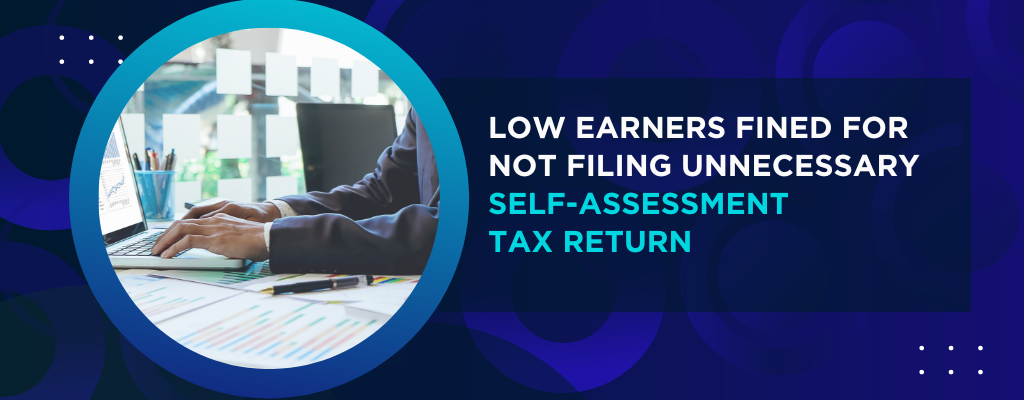Low Earners Fined for Not Filing Unnecessary Self-Assessment Tax Return
Self-assessment tax returns can be challenging to understand in the complex taxing world. The accuracy with which people record their income and profits yearly is critical to the government tax-collecting mechanism. Fines for low-income taxpayers who fail to submit unnecessary self-assessment tax returns have been developing as a disturbing trend in recent years.
It becomes clear that many low-income people get stuck in the confusing web of fines for failing to file tax returns. Tax specialists and the public are all debating the idea since it seems like a conflict to punish struggling individuals.
Let us look at the difficult circumstances of low-wage individuals who risk financial penalties for failing to file self-assessment tax returns. It helps you to learn about this problem and its more significant effects by looking into the source and possible options.
What are Self-Assessment Tax Returns?
A self-assessment tax return is essential to personal taxes since it provides a more detailed reporting of one’s financial situation to the tax authorities. It is often ideal for people with many income sources compared to the traditional tax withholding systems. The primary goal of filing tax returns is to maintain the accuracy of the tax system by ensuring that everyone pays the right amount.
Why are Self-Assessment Tax Returns Important?
When filing a self-assessment tax return, one can get a clear picture of one’s financial situation. It is essential for those with financial needs beyond their regular income. Tax authorities can determine the correct amount of tax due using taxpayers’ income, profits, and deductions. Hence, it helps to avoid situations where taxes are underpaid or overpaid.
Here are some kinds of taxpayers who use self-assessment tax returns are:
- Self-employed people, sole proprietors, and freelancers must account for all incomes and costs earned by their businesses.
- Rental income is taxable, and landlords must report that revenue and any applicable tax breaks.
- People who earn considerable money from other sources, like investments, must submit self-assessment tax returns.
The basis of every effective tax system is correct tax reporting. It prevents tax evasion, which can damage public services and guarantees everyone pays the proper taxes. Tax authorities depend on the details of self-assessment tax returns to verify and ensure compliance. Underpayment or overpayment of taxes comes from inaccurate reporting leading to incorrect tax assessments.
The Cause of the Issue
Due to many underlying problems, low-income taxpayers face exceptionally high penalties for failing to submit their self-assessment tax returns. Because of these causes, some people not eligible to file could pay. The following are some of such factors:
Self-assessment tax return filing requirements are likely complex and cover many situations. They may have a broad reach, making people unsure whether it includes their financial transactions.
The tax system’s inflexibility makes it impossible to consider people’s needs. It has no distinction between taxpayers with complex financial conditions and those with simple ones; treating them all the same.
Automated systems can levy fines based on predetermined criteria, regardless of one’s financial status. This results in penalties, even if they are unnecessary in some instances.
Due to the complex tax laws, low-income earners often misunderstand whether they must file self-assessment tax returns. For those without financial experience, tax law can be challenging to understand. So many low-income people may think they don’t have to file because of their low incomes, finding out they were unknowingly non-compliant.
The absence of transparent and readily available instructions from tax authorities is a major contributing factor. Individuals with simple financial status need precise details to determine whether they must submit self-assessment tax returns. Many people are unsure of their obligations since accessible materials require some financial knowledge.
Because of this confusion, some people might skip filing altogether, thinking they are exempt when they are not. In these situations, clear rules enabling taxpayers to meet their responsibilities properly become even more crucial.
Actions People Can Take to Avoid Unnecessary Fines

Taking preventive measures can assist low-income taxpayers in avoiding penalties and meeting their tax responsibilities as they handle complex self-assessment tax returns. Some helpful suggestions are as follows:
- Read up on the official tax rules published by the appropriate tax authorities. Depending on your financial situation, you may or may not require filing the tax return, and these rules can help you decide.
- Take your time to conclude your financial status. Find out your income source and whether it meets the requirements for self-assessment tax returns. Also, know what other sources of income or financial transactions can need a return filing.
- Consult tax specialists if you have any questions regarding your tax responsibilities. They provide tailored advice to your financial status, allowing you to make educated choices.
- It is crucial to keep detailed records of your financial transactions. This paperwork can back up your tax returns and help you avoid any inconsistencies that might cost you penalties.
- The rules regarding taxes are subject to change. Keep up with any tax revisions that might affect your filing needs. Keeping clear of upcoming issues is possible by routinely examining rules.
- Regarding tax season, several government agencies have online services available to the public. To determine whether a self-assessment tax return is essential, enter your financial data and follow the directions.
- If you are unsure about filing a tax return, it is best to file anyhow. If you file on time, you can avoid fines and correct any mistakes you have made.
- Note any correspondence you have with tax authorities about your filing queries. If you need to question a penalty in the future, these records can be helpful.
- If you need help understanding your tax responsibilities, consult trusted resources. Refrain from false information from unauthorised sources.
- You can appeal the ruling if you have received an excessive fine. If you believe you do not qualify to file, provide documents and proof to back up your claim.
Sum Up
There is an immediate need for change within our tax system, as shown by the problem of low-income people receiving penalties for not submitting unnecessary self-assessment tax returns. It is evident that finding a solution is more than financial matters; it is also about ensuring equal treatment in society.
Transparency and fairness are the basis of every tax system. It guarantees that assisting people according to their ability to pay. In addition to making things more difficult for those struggling financially, unfair penalties damage public trust in the tax system. Penalising those who can least afford it sends a troubling message for a system that tries to share the tax burden evenly.
Reforming this area together is essential to making the tax system fairer for low-income people. We can avoid unnecessary costs and promote the values of justice and accountability by simplifying rules and providing more transparent assistance.

